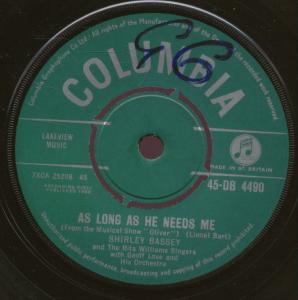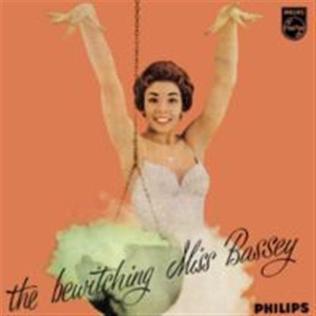
Dame Shirley Veronica Bassey is a Welsh singer. Best known for her career longevity, powerful voice and recording the theme songs to three James Bond films, Bassey is widely regarded as one of the most popular vocalists in Britain.
Norman Newell was an English record producer, who was mainly active in the 1950s and 1960s. He was also the co-writer of many notable songs. As an A&R manager for EMI, he worked with musicians such as Shirley Bassey, Dalida, Claude François, Vera Lynn, Russ Conway, Bette Midler, Judy Garland, Petula Clark, Jake Thackray, Malcolm Roberts, Bobby Crush and Peter and Gordon.

"Hold Me, Thrill Me, Kiss Me" is a song written by Harry Noble and originally performed by Karen Chandler in 1952. It has been re-recorded several times since then, the most notable covers being by Mel Carter in 1965 and Gloria Estefan in 1994.

"As Long as He Needs Me" is a torch song sung by the character of Nancy in the 1960 musical Oliver! and written by Lionel Bart. Georgia Brown, who was the first actress to play Nancy, introduced the song. It is a love ballad expressing Nancy's love for her criminal boyfriend Bill Sikes despite his mistreatment of her. In the film adaptation of the musical, it was sung by Shani Wallis.
"I'm in the Mood for Love" is a popular song published in 1935. The music was written by Jimmy McHugh, with the lyrics by Dorothy Fields. The song was introduced by Frances Langford in the movie Every Night at Eight released that year.

Get the Party Started is a 2007 album by Welsh singer Dame Shirley Bassey.
"(You'd Be So) Easy to Love" is a popular song written by Cole Porter for William Gaxton to sing in the 1934 Broadway show Anything Goes. However Gaxton was unhappy about its wide vocal range and it was cut from the musical. Porter re-wrote it for the 1936 film Born to Dance, where it was introduced by Eleanor Powell, James Stewart, and Frances Langford under its alternate title, "Easy to Love". The song was later added to the 1987 and 2011 revivals of Anything Goes under the complete title "You’d Be So Easy to Love".
"World in Union" is a theme song for the Rugby World Cup. Its melody is "Thaxted", from the middle section of "Jupiter, the Bringer of Jollity", a movement from Gustav Holst's The Planets, and was originally adapted by Holst for its use in the British/Anglican patriotic hymn, "I Vow to Thee, My Country", using words by Sir Cecil Spring Rice.

Maureen Evans is a Welsh pop singer who achieved fame in the 1950s and 1960s.

Never Never Never is a 1973 album by Shirley Bassey. It features the hit single title track, which was a UK top 10 hit, which became one of Bassey's best-known songs. The album also became a top 10 hit in the UK and was a moderate hit in the US.

Thank You for the Years is a 2003 album by Dame Shirley Bassey.

The Fabulous Shirley Bassey is the third studio album by Welsh singer Shirley Bassey, and her first for Columbia Records. It was recorded with Geoff Love and his orchestra, and peaked at #12 in the UK album chart in early 1961. Released in 1959, this was the first studio album from Shirley Bassey with completely new material. Her two previous albums issued on the Philips label were collections of new recordings and previously released material, recorded between 1956 and 1958.

I Am What I Am was the only studio album recorded by Shirley Bassey for the Towerbell Records label. Several other tracks were also recorded at this label and issued as singles only. The recording sessions took place at Olympic Studios, Barnes, London, in July and August 1984. Following the success of the previous album All by Myself, this album peaked at number 25 in the UK album chart and reached Gold status. This release was the first digitally recorded album made by Shirley Bassey and was issued on vinyl, cassette and CD. Consisting of mainly re-recordings from Shirley Bassey's back catalogue and two new songs, this album was recorded 'live' with The London Symphony Orchestra, conducted by Carl Davies. The album also reunited Shirley Bassey with Norman Newell, who had served successfully as her producer throughout the 1960s.

I've Got a Song for You is a 1966 album by Shirley Bassey. Bassey had left EMI's Columbia Label, and this was her first album for United Artists, a label she would remain with for approximately 14 years. This album and the following release And We Were Lovers were produced by Bassey's former husband, Kenneth Hume. The album entered the UK Albums Chart at #26, but only remained on the chart for one week, and failed to chart in the US, despite her having received outstanding reviews for live engagements in New York and Las Vegas that same year, and the fact that the album was recorded in New York. It was an inauspicious start for her at UA, as none of her albums would chart either in the UK or the US until 1970. In that year, 1970, Bassey would begin to produce more contemporary pop-oriented albums, but here in 1966, despite scoring her biggest hit with "Goldfinger" a year or so earlier, she was still firmly in the traditional pop genre.

The Bewitching Miss Bassey is the second studio album by Welsh singer Shirley Bassey. Consisting of new and previously released material, this was the first album by Bassey to be issued on the 12" Long-playing record format. Tracks were taken from sessions recorded between 1956 and early 1959. All the songs were recorded in the UK with Wally Stott and his Orchestra, with production by Johnny Franz. The only exception was "The Wall" which was recorded in New York with Jimmy Carroll and his orchestra and produced by Mitch Miller. Featuring Bassey's first five hit songs, including Bassey's 1958 number one single "As I Love You" and the huge hit "Kiss Me, Honey Honey, Kiss Me". The album showcases the best of the early career of Shirley Bassey. All the songs were only recorded in mono, no stereo versions are known to exist. In the 1970s Philips did re-issue them in an "electronically enhanced" stereo. The album was re-issued in the US on the Epic label with different artwork. While this album has not been issued independently on CD, it was included in its entirety on the four-CD compilation titled Five Classic Albums Plus Bonus Singles in 2012.
Michael Julien, also known as Peter Warne, was a British songwriter, who was the co-writer of a number of hit songs around the world. He wrote the lyrics of "Let's Live for Today", and co-wrote both "Kiss Me, Honey Honey, Kiss Me", and "Boom Bang-a-Bang", the winning song at the 1969 Eurovision Song Contest. He received an Ivor Novello Award for songwriting. He also practised as a psychotherapist.
The Magic Is You is a 1979 album by Welsh singer Shirley Bassey. Her final album for United Artists Records, the album notably featured a disco version of her signature 1968 song "This Is My Life".
"As I Love You" is a 1958 hit song by Shirley Bassey with Wally Stott & His Orchestra, written by Jay Livingston and Ray Evans for the Universal International motion picture, The Big Beat (1958).
"There's No Place Like London" is a song co-written by Lynsey de Paul and Gerard Kenny, and held by the British Library that was published by Lynsey de Paul Music/Chelsea Publishing Co Ltd/Arlon Music/Chappell Music. It was first recorded by Shirley Bassey backed with a 54 piece orchestra, produced by de Paul and released as a single in 1986. It was her last single for the independent British record label Towerbell Records and, unusually, the song starts with the chorus rather than a verse. As well as a stand-alone single in its own right, the song was recorded to promote the London Tourist Board. A promotional video was made that featured Bassey's daughter Sharon and grandson Luke as well as de Paul and cameo's from celebrities such as Michael Caine, Spike Milligan, David Frost and Frank Bruno. It was premiered at the Royal Albert Hall, with songwriter de Paul in the audience as part of Bassey's 30th anniversary concerts. The song was well received by the U.K. press. Bassey performed "There's No Place Like London" in 1986 as part of her “Live from the Piccadilly” show as well as on the 1987 Royal Variety Performance, and ironically for her "Shirley Bassey Live" in Berlin in honour of 750 years of Berlin in 1987. She also performed the song on prime time TV on "Des O'Connor Tonight" Christmas show. The song is considered as one of Bassey's defining, signature songs and is listed as part of her essential repertoire alongside other Bassey classics.

25th Anniversary Album is a compilation album by Shirley Bassey. Released in 1978 to mark her 25th year in show business, the album was a double set, comprising 40 tracks. The songs included span just 20 of the 25 years from 1957 to 1976, however, her first professional contract is dated 1953. Bassey had toured extensively throughout 1978 to mark her 25 years. This collection, including her biggest hits and some lesser-known recordings, became one of her biggest in the UK, where it reached No.3 and spent 12 weeks on the album chart.












